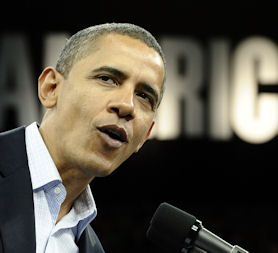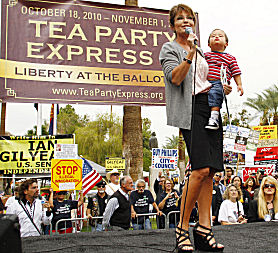US midterms: Obama admits ‘people are frustrated’
President Obama called the result “a shellacking,” acknowledging US voters want solutions on the economy. The election means the Republicans have control of the House, and Democrats the Senate.
Speaking at a press conference in the White House, a subdued President Obama said “I can tell you that some election nights are more fun than others. Some are exhilarating. Some are humbling.”
He went on to say that “clearly, too many Americans have not felt that progress yet and they told us that yesterday. And, as president, I take responsibility for that.
“What yesterday also told us, is that no one party will be able to dictate where we go from here, which we must find common ground in order to set, in order to make progress on some uncommonly difficult challenges.”
“I’m not suggesting this will be easy,” Obama said. “I won’t pretend that we’ll be able to bridge every difference or solve every disagreement.”
In the midterm election, the Democrats lost a whopping sixty seats in the House in the US midterm elections: sealing the shortest hold on power there for sixty years. The party’s defeat was overwhelming – and across the board – they lost seats from the south to the north east, which was once a Republican-free zone. Scores of Representatives – some who had held office for as much as 18 terms – were swept aside: from the most Conservative – like Mississippi’s Gene Taylor, to the liberal Tom Periello in Virginia, who’d become something of a poster-boy for the Obama healthcare reforms.

Channel 4 News Special Report - everything you need to know on the midterm elections
Six Governors’ mansions will be changing hands too: Republicans won in key states like Ohio, Pennsylvania and Michigan – also taking control of the state legislatures, which crucially make all the decisions about where to draw district boundaries, which only happens once every ten years.
Crumb of comfort for Democrats
The only crumb of comfort for the Democrats was keeping their hold on the Senate: where they have clung on to their 51 seat majority, with three seats left to declare. Thanks in part to the Tea Party, perhaps, as Christine O’Donnell was roundly defeated in Delaware, which the GOP should have picked up with ease – and Harry Reid unexpectedly, and narrowly, managed to see off Sharron Angle’s challenge in Nevada.
How have the US midterms changed the shape of the US Congress, both the House of Representatives and the Senate? Our graphic shows the gains and losses for both the Republicans and the Democrats.

And interestingly, Lisa Murkowski, Alaska’s Republican incumbent ousted in a primary by her Tea Party rival, is on course to win back the seat. But conservatives could equally point to states like Kentucky, where Rand Paul cruised to victory – and it must have been painful for Obama to see his old Senate seat in Illinois fall to the GOP. Veteran Democrat Russ Feingold, who once seemed unassailable, has succumbed to the Republican challenge in Wisconsin – as did Tom Sestak in Pennsylvania.
And just take a look at the key bellwether state of Ohio: as Ohio goes, so goes the nation, as the saying has it. And the Buckeye state delivered a massive slap in the face to the Democrats: they lost all of the competitive House races, the Senate race, the Governorship and control in the state’s House of Representatives.
We hope President Obama will now respect the will of the people, change course, and commit to the making the changes they are demanding. Republican John Boehner, set to become House Majority leader.
Ohio’s very own John Boehner – soon to become House Majority leader, is now the man of the moment.
“We are witnessing a repudiation of Washington,” he proclaimed. “A repudiation of big Government… and a repudiation of politicians who refuse to listen to the people.”
He’s already declared he’s only interested in pursuing the Republicans’ own agenda, adding: “We hope President Obama will now respect the will of the people, change course, and commit to making the changes they are demanding. To the extent he is willing to do this, we are ready to work with him.”
Obama will be making his reaction clear in his news conference this afternoon, but he’s already spoken to Boehner by phone, extending something of an olive branch. He doesn’t have a lot of choice.
So what happens next, in this brand new political dawn? For the Democrats – time to regroup and work out just where it all went wrong. Senator Evan Bayh, writing in today’s New York Times, admits that the party overinterpreted its win in 2008: “Talk of a ‘political realignment’ and a ‘new progressive era’ proved wishful thinking”.
He continued: “An electorate that is 76 per cent moderate to conservative was not crying out for a move to the left.”
Blame: Obama, or the economy?
Others, though, insist this is no time to abandon liberalism – blaming the economy, or Obama’s failure to communicate his message.
Whatever the cause, the same clamour for change that swept Obama to power in 2008 has made him its target today: Washington is still deeply distrusted, detested, even.

According to senior advisor David Axelrod, the President will listen up this time: “He’ll hear the messages the American people are sending. I think he’ll do that with care and with humility. But… his impulse is to focus on what we do next and how we respond in a way that’s constructive.”
And that’s how the Democrats are trying to spin their painful defeat – it’s not a vote against us, per se – but a vote for collaboration on Capitol Hill. Nice try.
The Republicans, who were all but written off in 2008 and seemed to be left fatally weakened and rudderless, have been completely re-energised by this campaign. Thanks to prodigious fundraising efforts – there’s a formidable machine in place for 2012.
They are now in a position to drive the political agenda on key issues like tax cuts, federal spending, and social welfare. That much maligned health care reform could even be in for the chop. They have already prepared their game plan – it’s all there in the Pledge to America.
Road ahead not easy for Republicans
But that is not to say they’ll have it easy. John Boehner now has the somewhat unenviable task of leading a House that’s sharply divided – not just between the two rival parties, but within his own ranks too. It’s his party which has to shoulder some pretty unrealistic expectations. Now he’s got to control a bunch of brand-new House members, all fired up and ready to go… and he’ll need to forge some kind of bipartisan compromise if any of his agenda has a chance of passing the Senate.
The Tea Party itself has emerged somewhat battered – but certainly unbowed: it was their narrative which drove much of this election campaign, and the millions who voted for their candidates won’t be easily silenced.

What is the Tea Party movement? Who Knows Who investigates.
And President Obama has to work out how to forge a relationship, of sorts, with this newly hostile Congress. Does he continue to talk about working together, while subtly blaming the Republicans for blocking everything? He might take note from the experience of one of his predecessors, Bill Clinton.
Back in 1994, Clinton faced gridlock in Washington as Newt Gingrich’s Republicans shut down parts of central Government, with a brick wall of opposition. Clinton was written off – but two years ago, he was back – the tide of political opinion turning behind him once again.
That’s because the US economy was starting to improve, of course – and once again, it’s the economy that’s going to be the key. It’s the overwhelming issue that drove voters to the polls – not healthcare, or any particular ideological agenda.
The Republicans, despite today’s victories, are actually even less popular than the President – their approval rating is just 41 per cent. The public just don’t like politicians. So co-operation between the parties, not fractious arguments, looks like the only way to go.
It may be too early to write the political obituary of liberalism – still less, the Democratic party. But if Obama doesn’t find a way of making the next two years work – the headlines on November 7th, 2012 might be even worse than today’s.
Felicity Spector is a chief sub-editor with Channel 4 News.
-
Latest news
-
Windrush scandal: returning to the UK after a forty year wait6m

-
Netanyahu ‘survival’ depends on ‘expanding war’ says head of Palestinian National Initiative5m

-
Proposed law change could strip parental rights from paedophiles5m

-
Hugh Grant settles privacy lawsuit against The Sun newspaper publisher2m

-
Post Office Scandal: what did top executive know?6m

-




